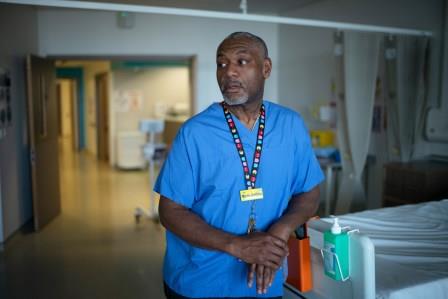Surgeon appointed first NHS clinical director for violence reduction

The NHS has appointed a Barts Health surgeon as its first clinical director for violence reduction to help prevent stabbings and other violent crime.
Martin Griffiths, a lead surgeon at The Royal London Hospital, has spent the past decade visiting schools to lecture on the dangers of carrying weapons as well as saving lives on the operating table. His appointment as Clinical Director for Violence Reduction in London comes after another weekend of bloodshed, which saw three more people killed in the capital.
Martin and fellow colleagues set up a pioneering ward-based violence reduction service after operating on young knife victims admitted in their school uniforms. His award-winning scheme sees hospital staff and case workers at charity St Giles Trust helping young patients injured through gang crime while they are still being treated in the hospital to help break the cycle of violence at the point of crisis. In six years, this has reduced the number of young people returning to The Royal London Hospital with further injuries from 45% to less than 1%.
Martin said: “Every day I see the wasted opportunities of young people stuck on hospital wards with life-changing injuries.
“We do everything we can for these patients but don’t just want to patch them up and send them back out to be injured again. And by working together across the NHS there is more we can do to prevent these attacks happening in the first place.
“I want to build a network that will empower communities across London to challenge the attitudes and behaviours that result in violence.”
Almost 5,000 people were admitted to hospital after being attacked with a knife or other sharp object last year, up almost a third since 2012-13.The rise was steepest amongst teens who accounted for 1,012 admissions last year, up around 55% from 656 six years ago.
Martin’s appointment was welcomed by NHS England Chief Executive Simon Stevens who said the approach could be adopted across the country.
Simon Stevens said: “Violent crime destroys lives and as a society we need to do far more to reduce violent crime.
“Martin’s commitment to patients doesn’t end when they leave hospital and his inspiring work at The Royal London, and in classrooms in the capital, has helped reduce the number of patients who recover only to return again with another gun or knife injury.
“Martin’s new role will help us do even more to break the cycle of violence and keep people – particularly young people – safe.
“However, he is just one of many doctors, nurses and other NHS staff trying to stem the bloodshed at source by tackling gang violence across the country and if this initiative works we would like to see it rolled out in all regions.”
There were 136 murders in the capital in 2018. The total number of London murders, excluding victims of terrorism, has shot up by 38 per cent since 2014.
Regional Director for NHS London, Sir David Sloman said: “Violent crime is one of the biggest challenges for the NHS here in London. It has a major impact on the wellbeing of NHS staff and our communities and it also puts significant pressure on hospital resources.
“Martin Griffiths brings unique expertise to this role, which will help us tackle the issue of violent crime in the capital and improve the NHS’ response to it.”
Lib Peck, Director of London’s Violence Reduction Unit, said: “I am delighted that the NHS has appointed someone of Martin’s experience and I look forward to working closely with him to tackle all forms of violence in the capital.
“The Violence Reduction Unit is taking a fundamentally different approach to tackling the complex causes of violence, which involves identifying the root causes and delivering early interventions to help prevent its spread.
"Our approach brings together specialists from health, police, local government and education, but it’s absolutely key we work together with communities if we want to really tackle the underlying causes of violence.”

 Afrikaans
Afrikaans Albanian
Albanian Amharic
Amharic Arabic
Arabic Armenian
Armenian Azerbaijani
Azerbaijani Basque
Basque Belarusian
Belarusian Bengali
Bengali Bosnian
Bosnian Bulgarian
Bulgarian Catalan
Catalan Cebuano
Cebuano Chichewa
Chichewa Chinese (Simplified)
Chinese (Simplified) Chinese (Traditional)
Chinese (Traditional) Corsican
Corsican Croatian
Croatian Czech
Czech Danish
Danish Dutch
Dutch English
English Esperanto
Esperanto Estonian
Estonian Filipino
Filipino Finnish
Finnish French
French Frisian
Frisian Galician
Galician Georgian
Georgian German
German Greek
Greek Gujarati
Gujarati Haitian Creole
Haitian Creole Hausa
Hausa Hawaiian
Hawaiian Hebrew
Hebrew Hindi
Hindi Hmong
Hmong Hungarian
Hungarian Icelandic
Icelandic Igbo
Igbo Indonesian
Indonesian Irish
Irish Italian
Italian Japanese
Japanese Javanese
Javanese Kannada
Kannada Kazakh
Kazakh Khmer
Khmer Korean
Korean Kurdish (Kurmanji)
Kurdish (Kurmanji) Kyrgyz
Kyrgyz Lao
Lao Latin
Latin Latvian
Latvian Lithuanian
Lithuanian Luxembourgish
Luxembourgish Macedonian
Macedonian Malagasy
Malagasy Malay
Malay Malayalam
Malayalam Maltese
Maltese Maori
Maori Marathi
Marathi Mongolian
Mongolian Myanmar (Burmese)
Myanmar (Burmese) Nepali
Nepali Norwegian
Norwegian Pashto
Pashto Persian
Persian Polish
Polish Portuguese
Portuguese Punjabi
Punjabi Romanian
Romanian Russian
Russian Samoan
Samoan Scottish Gaelic
Scottish Gaelic Serbian
Serbian Sesotho
Sesotho Shona
Shona Sindhi
Sindhi Sinhala
Sinhala Slovak
Slovak Slovenian
Slovenian Somali
Somali Spanish
Spanish Sundanese
Sundanese Swahili
Swahili Swedish
Swedish Tajik
Tajik Tamil
Tamil Telugu
Telugu Thai
Thai Turkish
Turkish Ukrainian
Ukrainian Urdu
Urdu Uzbek
Uzbek Vietnamese
Vietnamese Welsh
Welsh Xhosa
Xhosa Yiddish
Yiddish Yoruba
Yoruba Zulu
Zulu